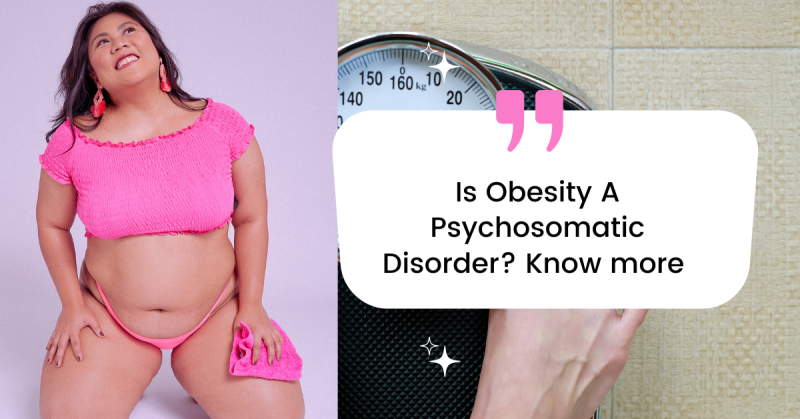+918048051883

This is your website preview.
Currently it only shows your basic business info. Start adding relevant business details such as description, images and products or services to gain your customers attention by using Boost 360 android app / iOS App / web portal.
Is Obesity a Psychosomatic Disorder? Obesity ...

Is Obesity a Psychosomatic Disorder? Obesity has emerged as a significant global health challenge, impacting millions of people. While commonly seen as a physical issue tied to diet and exercise, the intricate connection between the mind and body often goes unexamined. Could obesity, in fact, be a psychosomatic disorder? Here we will explores obesity as a manifestation of mind-body imbalances and how emotional factors, stress, and mental health can lead to weight gain and hinder weight loss. Understanding Psychosomatic Disorders A psychosomatic disorder involves physical ailments influenced or exacerbated by mental factors. In essence, the mind can profoundly impact the body, resulting in various physical symptoms or diseases. Conditions such as anxiety, depression, chronic stress, and unresolved emotional trauma can manifest physically, potentially contributing to obesity. The Mental Health Connection to Obesity While lifestyle factors like overeating and inactivity are often blamed for obesity, emerging research emphasizes the critical role of emotional and psychological elements. Here’s how mental health influences weight: 1. Emotional Eating and Stress: Chronic stress elevates cortisol levels, heightening appetite and cravings for high-calorie comfort foods. People often turn to food to cope with negative emotions, leading to overeating. 2. Depression and Weight Gain: A strong correlation exists between depression and obesity. Depression can cause fatigue and low energy, reducing physical activity. Emotional numbness may lead individuals to overeat as a form of self-soothing. 3. Trauma’s Impact: Past trauma, particularly in childhood, increases the likelihood of obesity. Trauma disrupts the brain's stress-response system, contributing to long-term mental health issues and weight challenges. 4. Body Image Issues: Low self-esteem and negative body image can perpetuate emotional eating and discourage healthy behaviors, creating a cycle of weight gain. Holistic Approaches to Psychosomatic Obesity Although obesity may not strictly fit the definition of a psychosomatic disorder, the link between psychological and physical health is undeniable. A holistic approach can address both aspects, leading to sustainable results: 1. Mindful Eating : This practice encourages awareness of hunger cues and promotes eating without distractions, helping reduce emotional overeating. 2. Stress Management: Techniques like meditation and yoga can alleviate stress and its physical effects, including cravings. 3.Therapeutic Support: Cognitive-behavioral therapy (CBT) helps individuals recognize and alter negative thought patterns related to eating. 4. Self-Reflection: Journaling about emotions and triggers fosters awareness of the psychological roots of eating behaviors. 5. Nutritional Counseling: Working with a holistic nutritionist can help individuals choose foods that support both physical health and mental well-being. Seeking Help for Psychosomatic Obesity If you suspect that psychological factors contribute to your weight struggles, professional guidance is essential. Combining mental and physical health support creates a comprehensive path to success. Here are steps to consider: 1. Consult a Holistic Healthcare Consultant: A tailored wellness plan can address both emotional triggers and physical needs. 2. Work with a Psychologist: Therapy can assist in processing trauma, managing stress, and developing healthier coping strategies. 3. Join Support Groups: Connecting with others facing similar challenges can provide valuable encouragement and accountability. Obesity is a complex issue with both physical and psychological dimensions. While not strictly a psychosomatic disorder, the interplay between mental health and weight management is significant. By utilizing holistic strategies like stress management, therapy, and mindful eating, individuals can achieve lasting wellness. If you’re interested in joining our holistic health care program, please contact us. FAQs Q: Can stress alone cause weight gain? A: Yes, chronic stress elevates cortisol levels, leading to cravings for unhealthy foods and emotional eating. Q: How does therapy help with obesity? A: Therapy, particularly cognitive-behavioral therapy (CBT), helps identify emotional triggers for overeating, facilitating healthier habits. Q: Can meditation aid weight loss? A: Yes, meditation reduces stress, increases mindfulness, and can lower emotional eating, indirectly supporting weight loss efforts. By addressing obesity from a holistic perspective, you can embark on a path to improved health and well-being, fostering balance for the body, mind, and soul.

